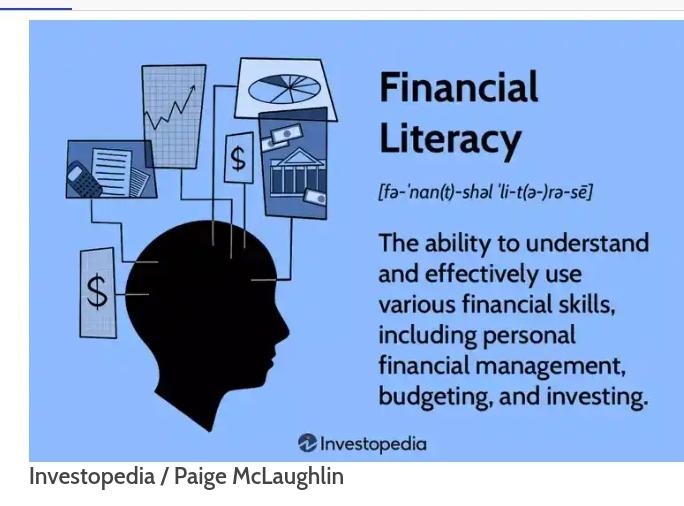WHAT IS FINANCIAL LITERACY?
Financial literacy is the ability to understand and effectively use various financial skills, including personal financial management, budgeting, and investing.
When you are financially literate, you have the essential foundation for a smart relationship with money. This can help start a lifelong journey of learning about the financial aspects of your life. The earlier you start to become financially literate, the better off you'll be because education is the key to a successful financial future.
Key Takeaways
The term “financial literacy” refers to understanding a variety of important financial skills and concepts.
Financially literate people are generally less vulnerable to financial fraud.
A strong foundation of financial literacy can help support various life goals, such as saving for education or retirement, using debt responsibly, and running a business.
Key aspects of financial literacy include knowing how to create a budget, plan for retirement, manage debt, and track personal spending.
Financial literacy can be obtained through reading books, listening to podcasts, subscribing to financial content, or talking to a financial professional.
Financial Literacy
Investopedia / Paige McLaughlin
Understanding Financial Literacy
Since about 2000, financial products and services have become increasingly widespread throughout society. Whereas earlier generations of U.S. residents may have purchased goods primarily in cash, various credit products are popular today, such as credit and debit cards and electronic transfers. A 2021 survey by the Federal Reserve Bank of San Francisco revealed that 28% of all payments were made via credit card, with only 20% being made in cash.
Financial literacy is the ability to understand and effectively use various financial skills, including personal financial management, budgeting, and investing.
When you are financially literate, you have the essential foundation for a smart relationship with money. This can help start a lifelong journey of learning about the financial aspects of your life. The earlier you start to become financially literate, the better off you'll be because education is the key to a successful financial future.
Key Takeaways
The term “financial literacy” refers to understanding a variety of important financial skills and concepts.
Financially literate people are generally less vulnerable to financial fraud.
A strong foundation of financial literacy can help support various life goals, such as saving for education or retirement, using debt responsibly, and running a business.
Key aspects of financial literacy include knowing how to create a budget, plan for retirement, manage debt, and track personal spending.
Financial literacy can be obtained through reading books, listening to podcasts, subscribing to financial content, or talking to a financial professional.
Financial Literacy
Investopedia / Paige McLaughlin
Understanding Financial Literacy
Since about 2000, financial products and services have become increasingly widespread throughout society. Whereas earlier generations of U.S. residents may have purchased goods primarily in cash, various credit products are popular today, such as credit and debit cards and electronic transfers. A 2021 survey by the Federal Reserve Bank of San Francisco revealed that 28% of all payments were made via credit card, with only 20% being made in cash.
WHAT IS FINANCIAL LITERACY?
Financial literacy is the ability to understand and effectively use various financial skills, including personal financial management, budgeting, and investing.
When you are financially literate, you have the essential foundation for a smart relationship with money. This can help start a lifelong journey of learning about the financial aspects of your life. The earlier you start to become financially literate, the better off you'll be because education is the key to a successful financial future.
Key Takeaways
The term “financial literacy” refers to understanding a variety of important financial skills and concepts.
Financially literate people are generally less vulnerable to financial fraud.
A strong foundation of financial literacy can help support various life goals, such as saving for education or retirement, using debt responsibly, and running a business.
Key aspects of financial literacy include knowing how to create a budget, plan for retirement, manage debt, and track personal spending.
Financial literacy can be obtained through reading books, listening to podcasts, subscribing to financial content, or talking to a financial professional.
Financial Literacy
Investopedia / Paige McLaughlin
Understanding Financial Literacy
Since about 2000, financial products and services have become increasingly widespread throughout society. Whereas earlier generations of U.S. residents may have purchased goods primarily in cash, various credit products are popular today, such as credit and debit cards and electronic transfers. A 2021 survey by the Federal Reserve Bank of San Francisco revealed that 28% of all payments were made via credit card, with only 20% being made in cash.
0 Reacties
0 aandelen
1K Views
0 voorbeeld




